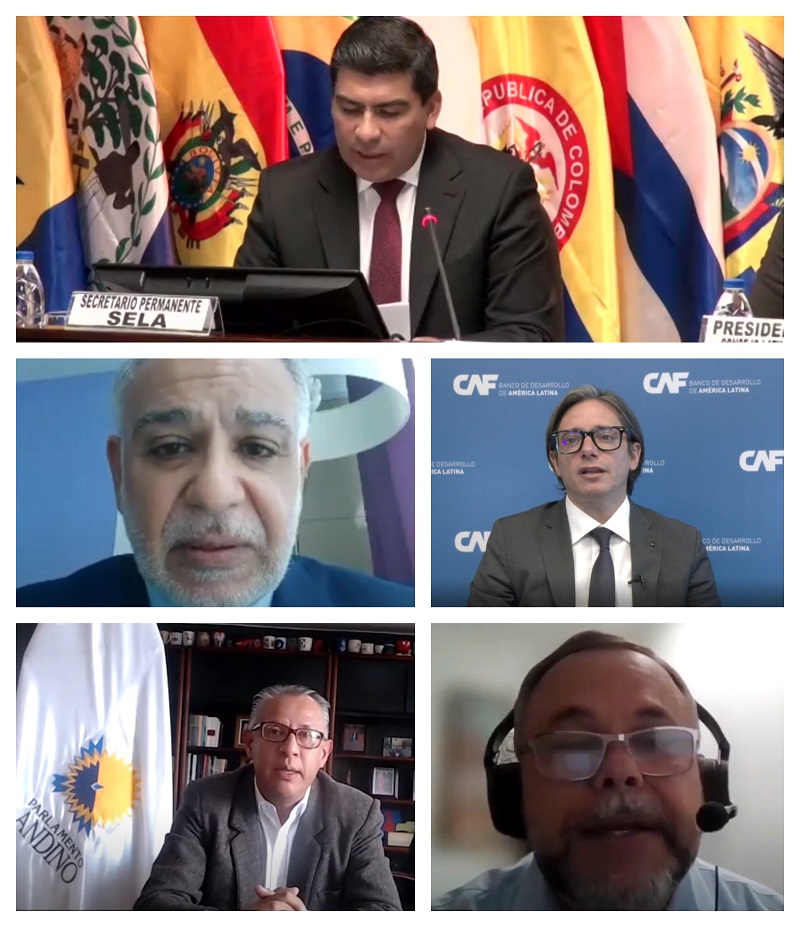SELA spearheads regional integration agenda with the accolade of counterparts
diciembre 02, 2021
autor: www.sela.org

Upon the implementation of a multi-annual work programme tailored to the needs of Member States and in response to the urgent concerns in the region as a result of the structural crisis, deepened by the COVID-19 pandemic, the Latin American Economic System (SELA) has agreed with its counterparts on a common agenda to capitalize on the existing potentials and prevent duplicity of efforts.
“Having received the support of the top decision maker of the organisation, we prepare to embark on a necessary process of changes, intent on overcoming rhetoric foundations and, instead, focusing our work on a technical, prospective and propositional line of action, in the context of cooperation and complementarity with the institutions of the region and their governments,” said Ambassador Clarems Endara, the Permanent Secretary of SELA, during the Regular Meeting of the XLVII Latin American Council of SELA.
The senior officer recalled that big challenges require from Member States enhanced cooperation, complementarity, and common strategies and stances to make headway with integration. “We know that Latin American and Caribbean countries have undergone since 2020 one of the worst economic, social and health ordeals ever, configuring a structural crisis that does not seem to end and stabilize at this point in time,” he added.
Multiple integrational schemes cohabit in Latin America and the Caribbean, including the Association of Caribbean States (ACS), the Pacific Alliance (PA), the Andean Community (CAN), the Caribbean Community (CARICOM), the Community of Latin American and Caribbean States (CELAC), the Common Market of the South (MERCOSUR), and the Central American Integration System (SICA), among others.
“SELA has been conceived as a mechanism for dialogue and promotion of integration. It aims at finding common strategies among countries, regionalize certain agendas, deepen integration,” Ambassador Endara said.
“But we need to lobby for a common agenda identifying us as Latin America and the Caribbean. The niche where SELA has a huge potential is precisely being the executive arm of major regional policies,” he affirmed.
In this regard, during his presentation at the Regular Meeting of the Latin American Council, Eduardo Chiliquinga Mazón, the Secretary-General of the Andean Parliament, agreed on continuing working on a common agenda required from integration organisations. “The Andean Parliament has the mission of buttressing Andean integration and project it towards the Latin American integration, and from that perspective we think we can do a work able to fortify in an built-in manner all the purposes of SELA to seek the development of Latin American and Caribbean citizens,” he said.
“We are convinced that, at this time of economic recovery, as we try to get out of the pandemic, it is imperative for multilateralism to scale the need for articulated agendas and more efficient responses to this post-pandemic era,” Chiliquinga Mazón advised.
Rodolfo Sabonge, the Secretary-General of ACS, also attending the event, said that both SELA and ACS gather many Member States in common. “We have coordinated to try to collaborate with certain strategic objectives, particularly for the countries of the Great Caribbean, mostly hit by this pandemic,” he said.
He strongly recommended working on digitalization and micro, small and medium-sized enterprises (MSMEs). “We deem digital conversion as a cross-cutting hub to be able to leave this critical situation, and sustainable tourism, for being one of the economic pillars of the region. We are ready and willing to cooperate with SELA,” Sabonge pointed out.
Manuel Messina, the Coordinator of Management and Regional Integration, Inter-American Institute for Cooperation on Agriculture (IICA), agreed on leveraging regional integration schemes and the agenda sponsored by SELA.
“We can see an enormous potential in the new work programme of SELA, especially in the thematic area of digitalization, and we are ready to help in all those topics as much as we can,” he said.
Finally, Christian Asinelli, the deputy CEO of Strategic Programming, CAF-development bank of Latin America, ratified their interest in continuing working on joint projects with SELA. “We, at CAF, share our integration objectives, favouring more and better policies for the region through the public policy index for MSMEs in Latin America and the Caribbean (IPPALC) and the programme of the Network of Digital and Collaborative Ports that they are developing with much success.”